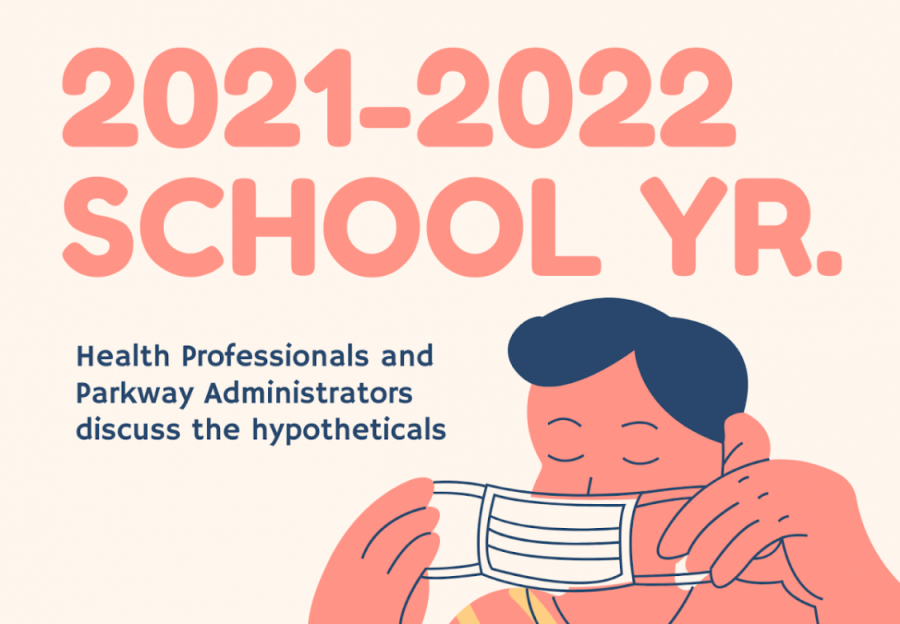American pharmaceutical and biotechnology companies, Moderna, Pfizer and Johnson & Johnson reached the end of the race for a vaccine in December. With all three companies currently administering vaccine distribution, immunizations became available to Missouri’s general public, as of April 9. With each vaccination, Health Professionals believe we are approaching our past state of normalcy.
Principal Jeremy Mitchell:
In the instance that the COVID-19 pandemic continues to subside, how do you imagine the 2021-2022 school year?
As for the 2021-2022 school year, depending on the nature of the pandemic, we are looking at a close-to-normal school year. We’ll have homecoming, pep-rallies, dances etcetera. I do see that masks will still be required, for all events including school, to serve as a safeguard. I think the general populace and community would agree that if we could have a normal school year, wearing masks would be a reasonable tradeoff. If sports spectators are masked, I do not think they will be regulated. We are also returning to semester-based learning, and a more normalized five-day-a-week in person schedule. We most likely will have an academic lab added into staff and student schedules.
Deputy Superintendent, Chelsea Watson:
Will the Parkway School District monitor and require vaccination upon entrance?
The decision to get vaccinated is an individual decision and is not reported to the school district. We can’t ask if individuals are vaccinated, thus we can’t make decisions based on data specific to Parkway.
Aamina Akhtar, Infectious Disease Physician and Chief Medical Officer at Mercy Hospital South and the first person to receive the vaccine in the St. Louis area:
What would be your advice to someone on the fence about vaccination?
To keep things in perspective, when it comes to public health when you look at over centuries and centuries of what kills people, there are two big things that have started saving lives: Clean water and vaccines. When it comes to vaccines, you need to look at the data and science behind them. We know these vaccines are very effective and very safe. Many rumors exist that the vaccines were causing sterility for example, in that case, get those questions answered. Talk to your OB [obstetrician] or a healthcare professional and you’ll realize that’s not true.
Considering that the COVID-19 vaccines have not been proven to be free of health issues down the line, what would you say to someone with vaccination hesitations?
When people talk about it causing possible health conditions, you can’t guarantee that it’d not, it’s a question, but if you get COVID-19 we know for a fact it does cause health conditions. When you look at problems induced by the virus, there’s a variety of neurological, mental and heart issues. You have something that does cause issues, then something to prevent it.
Are you a believer in herd immunity?
If people get vaccinated at a good level (80%+) that’s herd immunity, so there’s enough immunity that even if the virus is running around, it really doesn’t affect people. If we can reach herd immunity and people are protected then it’s a world where we don’t have to wear a mask anymore. We know with the vaccines coming out and people taking them there’s going to be limitations with what people are going to do.”
Is there a likely potential for non-vaccinated persons restrictions in the future?
People who are not vaccinated will have travel restrictions, maybe school restrictions, there are colleges out there who are starting to vaccinate who say if you’re not vaccinated you can’t come back. There are going to be hospitals that say if you’re not vaccinated you can’t work there. Get some good information and make good choices about it.
Jane Griesenauer, Health teacher at South High School:
Which organization’s direction will we follow when it comes to making decisions for next school year?
There are likely to be several entities whose guidance the district will have to take into account as we move forward, such as the CDC, the St. Louis County Health Department, DESE, and MSHSAA.
What are the benefits and pitfalls of herd immunity?
The main benefit of herd immunity is that it protects the most vulnerable in the community who cannot get vaccinated, such as those who are immunocompromised. However, it only works if enough people get vaccinated in every community. Many times, those who choose not to get vaccinated live in the same community, and therefore no one in that community can reap the benefits of herd immunity. For example, if the state of Missouri as a whole reaches herd immunity, but a particular community does not, then those who are immunocompromised in that community may not reap the benefits of herd immunity. That is a major pitfall.




![Smiling in a sea of Longhorns, Fox 2 reporter Ty Hawkins joins junior Darren Young during the morning Oct. 3 pep rally. The last time West was featured in this segment was 2011. “[I hope people see this and think] if you come to [Parkway] West, you will have the time of your life because there are so many fun activities to do that make it feel like you belong here. I was surprised so many people attended, but it was a lot of fun,” Young said.](https://pwestpathfinder.com/wp-content/uploads/2025/10/Edited2-1200x798.jpg)
![West High seniors and families listen as a representative of The Scholarship Foundation of St. Louis, Teresa Steinkamp, leads a Free Application for Federal Student Aid (FAFSA) workshop. This session, held in the library, provided guidance on financial aid, scholarships and student loan options. “This event is very beneficial for any seniors who are applying to or considering applying to colleges after high school [because] the cost of college is on the rise for seniors and parents,” college and career counselor Chris Lorenz said.](https://pwestpathfinder.com/wp-content/uploads/2025/09/DSC_4478-1200x778.jpg)
![Senior Kamori Berry walks across the field during halftime at the Homecoming football game on Sept. 12. During the pep assembly earlier that day, she was pronounced Homecoming Queen. “I thought it was nice that the crowd [started] cheering right away. I know [my friends] were really excited for me, and my family was happy because typically non-white people don't win,” Berry said.](https://pwestpathfinder.com/wp-content/uploads/2025/09/DSC7046-Enhanced-NR-1200x798.jpg)



![Pitching the ball on Apr. 14, senior Henry Wild and his team play against Belleville East. Wild was named scholar athlete of the year by St. Louis Post-Dispatch after maintaining a high cumulative GPA and staying involved with athletics for all of high school. “It’s an amazing honor. I feel very blessed to have the opportunity to represent my school [and] what [it] stands for,” Wild said.](https://pwestpathfinder.com/wp-content/uploads/2025/05/unnamed-6-1200x714.jpg)
![The Glory of Missouri award recipients stand with their certificates after finding out which virtue they were chosen to represent. When discovering their virtues, some recipients were met with contented confirmation, while others, complete surprise. “I was not at all surprised to get Truth. I discussed that with some of the other people who were getting the awards as well, and that came up as something I might get. Being in journalism, [Fellowship of Christian Athletes and] Speech and Debate, there's a culture of really caring about truth as a principle that I've tried to contribute to as well. I was very glad; [Truth] was a great one to get,” senior Will Gonsior said.](https://pwestpathfinder.com/wp-content/uploads/2025/04/Group-Glory-of-Missouri.jpg)

